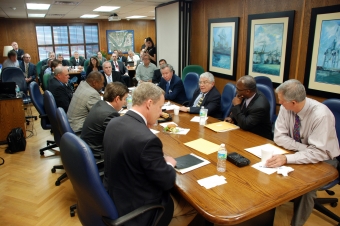Summary:
It is an activity that focuses on understanding the set of incidents rules about the concession and production sharing contracts for oil exploration and production. It starts from constant concrete problem of the Production Sharing Agreement - that is: the framework of the supply of the domestic market hypothesis to the renegotiation clause. It is intended that students understand the modeling and the economic logic of each of these contracts so that, from there, they can transit through civil law and administrative law in order to reflect about the incident regulation of such contracts. This dynamic was previously applied to the "If Petrobras: Contract Analysis (4) - Contractual Clauses comparison" and then to "Petrobras case: Contract Analysis (2) - Sections of take-or-pay and ship-or-pay and contract writing ".
Objective:
- GENERAL GOAL: the understanding of model contracts for exploration and production of oil and the reflection on the legal qualification and incident regulation (civil law and/or administrative law and/or specific ruling right);
- SPECIFIC GOAL: to think in alternative solutions to a specific problem arising from the writing report of the Brazilian production sharing agreement: the framework for the domestic market supply forecast (clause 17.8) the renegotiation hypothesis (clause 33.4.1).
- In order to that, it is intended that students move between (i) notions and rules of administrative law (example: the prince fact, economic and financial balance, bidding, etc.) and (ii) notions of civil law rules (excessive burden, contract review, renegotiation, etc.), so that they can (i) legally qualify the contract, so then, they can think about the applicable of legal regime, in the light of a concrete problem, and (ii) realize that the application of different legal regimes can lead the production of similar or even the same effects.
Dynamics:
- TEACHING METHOD: Problem-Based Learning. From a real controversy arising from the wording of the sharing agreement, the students are challenged to understand the contractual models and to reflect on the incident regulation; - REQUIREMENTS: There is a previous required reading, which corresponds to: (i) the text that introduces the problem by introducing uncertainty about the framework of the domestic market supply clause to the renegotiation clause, bringing the report of the two clauses; (ii) the text to the choice of the students on contract renegotiation under private or public law.
- INTRODUCTION TO THE DYNAMICS: the professor presents the difference between sharing and grant or delivery excerpts from texts that expose the differences (10 to 15min). Then, the students expressed their first impressions about the legal nature of the contracts and, consequently, on the set of incidents rules on such contracts (if specific laws, if general system of administrative law, or if civil law regime). - DEVELOPMENT OF THE DYNAMICS: in 1 hour, the students get together in six-member groups to, in the light of compulsory prior reading and the initial discussion, answer the question of the frame of the domestic market supply situation to the case of contract renegotiation, justifying its position from the regulation they deem focus. The professor circulates around the room and universalizes topics and questions that arise from the students or groups. The students deliver an opinion in the end that contains the answer to the problem;
- END OF THE DYNAMICS: when he/she sees the exercises of each student, the professor can see how they are understanding the contract, the regulation and how they are making the relationship with the facts, bringing its comments in the beginning of the next class (30min);- ATTENTION IN THE CLASSROOM: It is recommended that students be required to consider whether the definition of the legal nature, in this case solves the problem or not. It is also necessary that they think about the incident regulation about the production sharing contract based on the effects that will be produced, since in that case, the application of civil law or administrative law will lead to very similar results, but by arguments distinct.
Evaluation:
- FEEDBACK: In the end of class, the professor asks the exercises done by students. At the beginning of the next class, the professor briefly raises some questions and some topics that emerged in the synthesis, trying to present what they concluded of the contract. Subsequently, the reports are delivered with comments.
- GRADE EVALUATION: the exercise will be worth of 6 points (and will be aggregated with the workshop, which will be worth of 4 points). This grade composes the part of the general activity evaluated of the course participation grade. The evaluation criteria follow the reasoning syllogism: adequacy of qualification (2 points), correct application of regulation (2 points) and presentation of the effects of qualification (2 points).
Observation:
Copyright from the cover page image (cropped):
Image: "FPSO OSX-1", available by the Wikimedia Commons user "Edersguerri", picture of the own user, under the Creative Commons BY-SA 3.0 license






